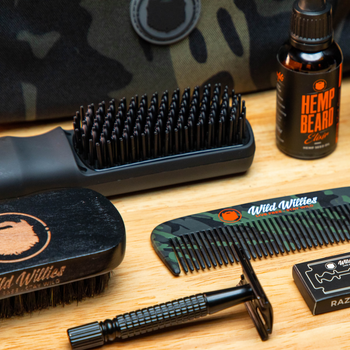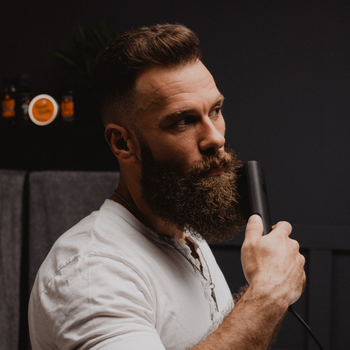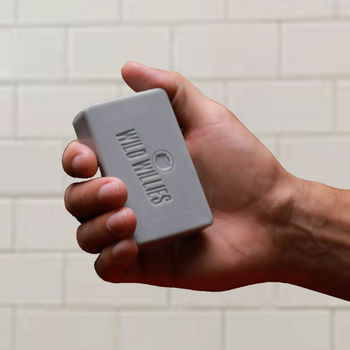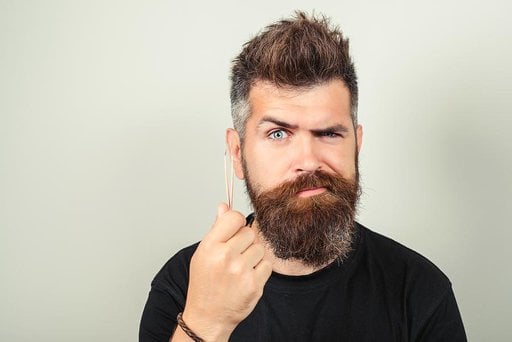Now that you've grown a full and luscious beard, you know what else you can add to bring your chiseled and masculine look to the next level — a tattoo.
Beards and tattoos go together like peanut butter and jelly, or pizza and beer…
But before you roll up your sleeve for an ink master, we want to make sure you know what you’re getting yourself into before you get your first tattoo.
There are at least 9 things you need to know before sitting in that parlor chair…
1. Cost
Before getting your first tattoo, consider the financial costs…
With inking, the more expensive a piece is, the greater detail and experience of the artist, generally speaking. Don't think you’ll get a full back tattoo for $20.
While there may be an artist willing to work on you for that price, the work will often reflect the dollar amount.
In our experience, you’ve got a shop minimum that usually sits around $50 or $60 (but that can vary depending on the shop) with an additional rate for every hour you’re in the chair (which also varies from shop to shop).
And don’t forget to tip your artists 😊.
2. Permanence
In case you didn’t know, tattoos are permanent… It’s necessary to ponder on that for a moment because not everyone does.
While getting an emoji inked on your arm may seem funny now, give it a week. You might not think so after too long.
Tattoos are pieces of art, and you want to select a piece or create a design symbolic to you, one that means something.
You don't want to look in the mirror five years from now and ask yourself why you're stuck with a winking smiley face on your bicep…
Or maybe you do. We won’t judge.
3. Pain
One of the critical things to know before getting a tattoo is the pain.
Getting ink on certain areas of your body, like your ribs or collar bone, will definitely hurt more than others. But no matter where you put the piece, it’s sure to hurt at least a little.

The process uses a tattoo gun that jabs you with multiple tiny and precisely placed needles, so it’s important to know your pain threshold.
If you get squeamish after a paper cut, then you may want to avoid getting a tattoo.
4. Placement
If you’re concerned about the pain during the appointment, consider the placement.
Areas of muscle and fat are typically less painful than areas over bone. One of the most painful locations for many people is over the ribs.
You may also want to consider placing tattoos in coverable areas. Many people love tattoos, but they don’t realize that too many visible pieces can reduce job prospects.
Fortunately, this is a trend that’s slowly changing around the world as tattoos are becoming more and more common in the professional world.
But still, it’s something to consider for the immediate future depending on your career path or job field.
5. Season
A common mistake of first-timers is getting a tattoo in the summer.
Warm weather is the enemy of fresh ink for several reasons, but the primary issue is sun exposure.
People wear less clothing in the warmer months, exposing their arms and legs. Because the extremities are popular tattoo locations, the freshly inked skin often ends up in direct sunlight, leading to irritation and early fading.
That being said, fall and winter are the best times of the year to get inked.
6. Artist
Finding an artist is on the top of the "what to do before getting a tattoo" list.
Most reputable artists have portfolios available for clients to peruse. You can also get personal recommendations from experienced friends or look online for reviews.
But just like any other subject, don’t trust everything you see or read online. Some tattoo artists post pictures of work that isn’t their own to entice potential clients.
7. Allergies
Before getting a tattoo, sometimes it’s wise to consult with a doctor about any potential problems.

Skin allergies are the primary reason to avoid tattoos. But a doctor can help you decide if a tattoo is OK despite existing allergies.
Unfortunately, there’s no way to tell how your body will react to inking until you do it, so make sure you get an initial all-clear.
If you do go ahead and get a tattoo against the doctor's orders, be prepared for any problems that may occur, like swelling, rashes, lumps or other reactions.
8. Health
Any reputable tattoo artist should understand essential health and sanitation protocols.
Before trusting your body to any artists, ask about their licensing or education and experience…
Do they know about blood-borne illnesses? Do they use new needles with every client? How are the needles stored?
All tattoo artists should know the standards of care in their practice and be willing to explain how they work to keep you safe.
Unfortunately, not every state requires individual licenses for artists, so know your risks and do your research. Again, asking close friends and checking out reputable reviews never hurts.
9. Aftercare
You may think that aftercare instructions are mandated, but this isn't the case in every state.
The primary concern for aftercare is making sure the tattoo area heals. After completing the piece, the artist should cover it with petroleum jelly and a bandage.
After about 4 hours, you can remove the bandage and wash the area with antimicrobial, scentless soap and water. Don’t wait longer than 12 hours to remove the bandage.
Once cleaned, cover the tattoo in a scentless lotion or ointment, like Wild Willies Tattoo Butter, a couple times a day for the next several weeks to make sure your new ink doesn’t dry out.
The lotion keeps the area moisturized and healthy, protecting the skin and tattoo from damage.
But don’t smother it. Remember, you want the tattoo to heal, so make sure you don’t apply too much that both your skin and the fresh ink can’t breathe.
Do Your Research
The culmination of all the items on this "what to do before getting a tattoo" list is to research and understand your risks.
Half of getting a tattoo is understanding what you want and who can give it to you, but the other half is aftercare and protecting your health.
Beard And Tattoos
While our customers may know Wild Willies best for beard care, we’re here to look after the entirety of your grooming routine, including the care and protection of your tattoos.
We understand that beards and tattoos are like cookies and cream, always better together. So check out our Wild Willies Tattoo Butter premium tattoo balm to help protect all your ink, new and old.







